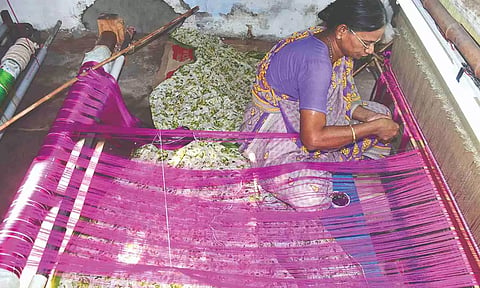

CHENNAI: Any traditional wedding in South India is incomplete without a pattu sari. Though wearing a Kancheepuram pattu sari continues to be a matter of pride, over the years, weavers in the temple town lament over duplicate pattu sarees eating into their business, which is already gasping for survival.
For the last couple of decades, silk manufacturing has been adversely affected in Kancheepuram. Though loss of patronage is one of the main reasons, duplicate pattu not only costs them their livelihoods, it also blemishes the authenticity of a pure pattu sari.
Around 10 years ago, the State government introduced the Silk Mark logo to identify the real pattu in the market but now, the logo is also being replicated for duplicate silk saris.
Weavers explained that an original pattu sari made in Kancheepuram will weigh about 800-1,100 gm but a duplicate pattu, that are labelled as original silk, will weigh only about 600 gm.
E Moorthy, Secretary, Weavers Association in Kancheepuram, said, “The original pattu zari consists of 400 gm of silver and 2 gm of gold. A duplicate pattu sari doesn’t have even a gram of silver or gold, as it’s made by painting the zari with silver and gold colour.”
K Krishnamoorthy, a silk weaver in the temple town, concurred and added: “I’ve have been in this business for the past 25 years. Duplicate pattu existed even back then but it wasn’t as common as it’s now. The circulation of duplicate pattu saris increased in the market after the lockdown in 2020.”
He pointed out that the duplicate pattu sari would look completely like an original, and a common man will be unable to tell the difference.
“There are machines that can authenticate the original pattu. Only by using those can anyone tell the difference for sure,” added Krishnamoorthy.
Several weavers DT Next spoke to said that a few shops in Kancheepuram buy duplicate pattu saris from manufacturers in Salem and Bengaluru for low process. “They sell these saris in Kancheepuram by sticking the fake Silk Mark logo. A sari purchased for Rs 2,000 in Bangalore will be sold for Rs 6,000 here. This hits us hard, as we work long hours on every sari,” lamented a weaver in the district. “It takes about 10-15 days to complete a full pattu sari and it weighs around 1 kg. We get paid around Rs 5,000/sari.”
Now, using machines, companies are manufacturing polyester-mixed pattu saris within a few hours. Due to its low cost and high profit margin, shops prefer to stock these saris, stated weavers.
“When people from other districts and states visit Kancheepuram to buy pattu saris for any occasion, middle-men at the junction target them and take them to the shops that sell duplicate pattu. Unbeknownst to them, they end up spending a lot on a duplicate pattu sari. They don’t realise it until a couple of years later, when the colour of the zari starts to wear out,” explained another weaver.
Rajeswari who purchased a pattu sari for her daughter said that they had purchased it in Kancheepuram believing it to be pure pattu but after a year, the sari started to fade and the border became dull within five years.
“I still have my wedding sari bought 35 years ago in Kancheepuram. The borders are perfect, and the zari still looks rich,” she said.
Sivanandam, a long-time member of the Corporative Society in Kancheepuram, said, “We have requested the district administration to look into the issue and take action against shops selling duplicate saris with the fake Silk Mark logo. It’s a serious issue, since duplicate pattu has been flooding the market every day.”
When contacted, Sridhar, deputy director, Handloom Department, admitted to being aware of the problem.
“We’ve been conducting frequent raids and issuing notices to the shops selling duplicate pattu saris with fake labels. If the shop continues to sell them, penalty will be imposed. After frequent raids, we learnt that many shops have stopped selling them,” he said.